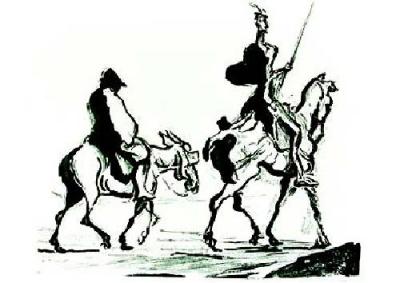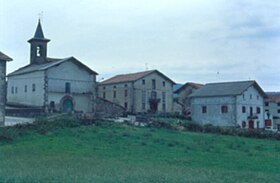Day Five: Trust.
Zubiri to Trinidad de Arre (14km).

Sandra and I began the day with a search for the post office. We were directed to a magnificent old mansion. In the style of the region, it was dusty cream-coloured stone on the outside and rich and dark with carved wood on the inside. I am trying to think what sweet would give the same effect – some kind of white chocolate with a dark fondant filling, I suppose, dusted with icing sugar. A chunky oak staircase rose from the hall and the floor was black cobble stones arranged in fan-tail patterns.
A man was standing in the shadows, next to four bicycles. We felt very silly in the intimacy of his private house. Clearly the house was not a post office. We apologised and explained what we were looking for. He motioned to one of the heavy oak doors: ‘There. That’s the post office.’
We were surprised, but tried to believe him.
He knocked on the door, but there was no reply. ‘I don’t know where she is,’ he said.
We went back out into the sunlight, with our friend following behind. ‘Ah! There she is!’
A woman was walking along the river bank with her shopping bags. He introduced us. She agreed that she was the post woman. What did we want? She waited attentively while we got the words out, and then looked a little disappointed. Oh, stamps. She didn’t have any stamps.
We stood on the mediaeval bridge where I had seen the old woman the previous evening while Sandra went into her musical Virgin-Mary-receiving-the-holy-spirit routine, tipping forward repeatedly and shaking her head. Certainly this visit to a post office had been an unusual one. After a while I became stern and drew her away from laughter onto the business of the day. We set off.
Sandra progressed in a lurching gait from one hedgerow to another in spasms of berry-led greed. I was reminded of times as a teenager when I rode some cynical old pony in a long line of cynical ponies on a ‘hack’ for horse-sick teenage girls. My creature would get his head down onto the grass and could not be pulled up or budged. Kick, kick, kick went my little heels, but without making the slightest dent on the consciousness of my animal.
The sun climbed. At half past eleven it began attacking in earnest. The path left the shade of the river and joined the road. There was no shelter now. I had on all the defences I could muster. I was smeared in cream and obscured by a floppy white nylon-straw hat and a pair of bug-eye sun glasses.
My friend began her Behold-the-handmaid-hee-hee routine again. In a serious moment she asked, ‘Do you always dress like that?’ Did she really imagine that I walked around London in a skirt with an elastic waistband, a huge pair of trainers, and a floppy nylon hat? But then, I suppose, she had never seen me in anything else, and my normal clothes were probably only a fraction smarter.
We passed a man in a dried up wasteland of a field. He was gathering armfuls of vetch to feed his livestock. Sandra asked him to take a photo of us. This was cruel, but she was carrying my things in our communal bag, so it was small price to pay. The man got the giggles looking at us through the view-finder and it took ages for him to calm down enough to hold the camera still and click the button.
For lunch, we walked down to the river through an orchard of cherry trees too old and shrunken to yield much fruit. Around them grass, vetch and herbs grew in a profusion of brown stems. They crackled underneath our feet and gave off gorgeous scents, half dying though they seemed, and flickered with insects. Clouds of butterflies rose ahead of us as we walked. I hadn’t seen such profusion of butterflies for years. I remembered holidays in Cornwall in the ’70s and ’80s when the stone-and-turf walls trembled with Meadow Browns and Cabbage Whites and the lilac bushes were smothered. But butterflies are so sparse now in England I had begun to doubt my memory. Here there were Cabbage Whites and Blues, presumably feeding on the vetch, and one orange butterfly and a large brown and white Fritillary.
We sat in the spattered shade of a grove of poplar trees. I dug into my potato crisps, Sandra spread her strawberry jam. We had known each other now for four days, shared long conversations, silence, evenings and mornings. We each knew the other had a boyfriend, but we had stayed off the subject with a delicacy, a desire not to fall into the clichéd confidences of normal female conversation. Now on a hot afternoon, sitting on tree stumps, curiosity bubbled up….


